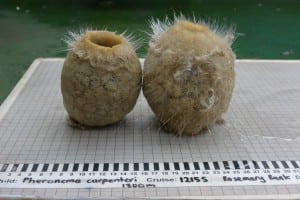Marine
New data portal on deep-water Vulnerable Marine Ecosystems in the North Atlantic released
February 23, 2016 by Marine Scotland Communications No Comments | Category Collaborations, Marine Directorate general, Marine Directorate Science

goblin cup sponges
Knowing where the various deepwater habitats and species exist is important for conservation and management. Over the last 5 years, Marine Scotland scientist Dr Francis Neat has been working with the International Council for the Exploration of the Sea (ICES) – a global organisation that develops science and advice to support the sustainable use of the oceans – to collate data on deep-water Vulnerable Marine Ecosystems in the North Atlantic.
This month ICES launched a data portal to make this information available to view and download from the web. This is an important milestone for Francis and his working group colleagues from the Working Group on Deep-water Ecology (WGDEC). A significant amount of the database includes Marine Scotland’s own data, such as video surveys and the by-catch trawl sampling that another Marine Scotland scientist, Jim Drewery, has been responsible for.
Head of Marine Scotland Science, Professor Colin Moffat said:
“This is a landmark for the work ICES WGDEC has been doing over the past decade. It has been a big collaborative effort between the ICES data centre, Francis, the Joint Nature Conservation Committee (JNCC) and the various working group members from all over Europe and beyond. The work of the ICES WGDEC is now far more transparent and accessible.

bubble gum coral
This is a tremendous achievement, brought about by the foresight and drive shown by Francis.
I would like to congratulate Francis for leading such a successful process. This again shows the lead position that Marine Scotland has in many aspects of marine science. It is a credit to Francis, our staff who have spent many days at sea, the crew of MRV Scotia and those who analyse the data back in the laboratory, that such an important resource is now available.”
Dr Neat said:
“This data portal will not only be of interest to deep-sea scientists who may wish to use the data for research, but also to stakeholders who wish to view the data underlying the scientific advice provided to them by ICES”
Further Information
- Access the data portal
- International Council for the Exploration of the Sea (ICES) press release about the portal
- Marine Scotland Science website
- Marine Scotland video surveys
- International Council for the Exploration of the Sea (ICES) website


Leave a comment